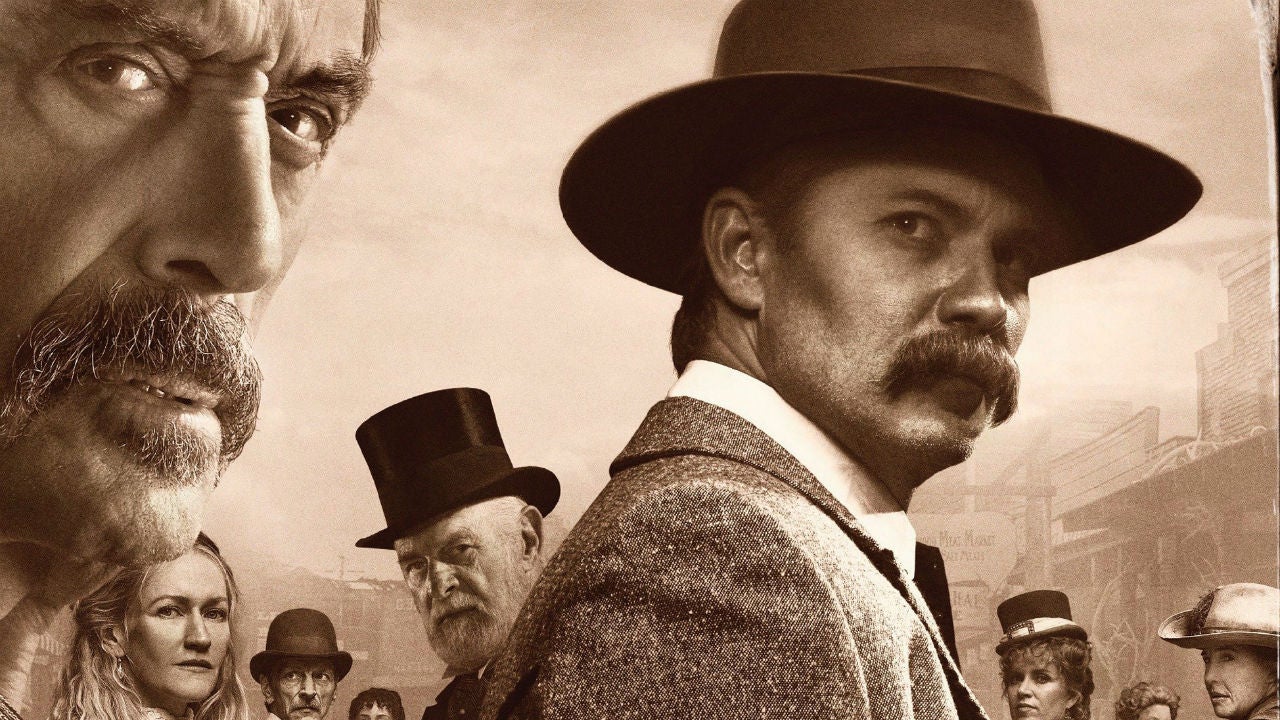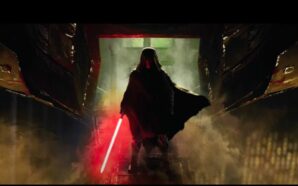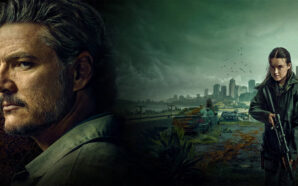First of all, I apologise for the terrible title. I just couldn’t help myself. But more importantly, Deadwood’s back! 13 years after the HBO series came to an abrupt end after a three-season run, Deadwood returns as a made-for-TV movie, written by David Milch, which offers our final glimpse of the occupants of the titular western town. Now, I can’t in all honesty say that I’ve been waiting for over a decade for this movie because 13 years ago I was watching Transformers films, jaw agape. I only started watching the series a couple of years ago, and even then I never got ‘round to watching the third season because the series just didn’t click with me. It was only a few months ago that I decided to sit down and watch the entire show, rewatching the first two seasons and then watching the third season for the first time. I found a much greater appreciation for the show that second time around and, while it’s not one of my very favourites, I place it highly on the pantheon of all-time great television. So, I’ve not been waiting for the film for years like some. In fact, I watched the film less than twenty-four hours after I finished the final episode of the show. In this age of reviving old television series, I think the Deadwood movie is one of the very best, maybe second only to Twin Peaks: The Return.
“It moves me greatly, returning after years have passed, to witness the changes wrought by time, ingenuity and invention. Though none would deny the facts and the cost of the past, we who gather have known together some portion of which must be measured in blood”.
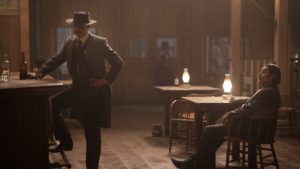 Those are some of the first words uttered by George Hearst in the Deadwood movie, after – like us – not stepping foot in the town for about a decade. They also begin to sum up the themes of the film and offer a cap to those of the series. To me, the series always seemed to be about the foundation of a community, born from lawlessness and baser instincts, as it develops into a more modern civilisation. In the movie, Hearst represents, and almost literally brings with him, the future and both the past and future haunts the characters throughout its runtime. Hearst seeks to install telephone lines across the Black Hills and when Charlie Utter refuses to sell him his land, Hearst has him murdered. Hearst is forcibly bringing the future to Deadwood and that clashes with this still relatively newfound community. Deadwood stands together, acting as a community with a voice stronger than it has ever had before, having grown during the series and the ten years subsequent, and the townsfolk face the future on their own terms rather than George Hearst’s. Of course, they’ve not completely matured as a civilisation and their response primarily consists of beating Hearst to a bloody pulp. It’s the Marshall Seth Bullock that makes the final defining move in saving Hearst’s life after catching a glimpse of his wife and children across the thoroughfare, interpreting the law and choosing justice, no matter how skewed it will be in Hearst’s favour, over the once dominate lawlessness of Deadwood.
Those are some of the first words uttered by George Hearst in the Deadwood movie, after – like us – not stepping foot in the town for about a decade. They also begin to sum up the themes of the film and offer a cap to those of the series. To me, the series always seemed to be about the foundation of a community, born from lawlessness and baser instincts, as it develops into a more modern civilisation. In the movie, Hearst represents, and almost literally brings with him, the future and both the past and future haunts the characters throughout its runtime. Hearst seeks to install telephone lines across the Black Hills and when Charlie Utter refuses to sell him his land, Hearst has him murdered. Hearst is forcibly bringing the future to Deadwood and that clashes with this still relatively newfound community. Deadwood stands together, acting as a community with a voice stronger than it has ever had before, having grown during the series and the ten years subsequent, and the townsfolk face the future on their own terms rather than George Hearst’s. Of course, they’ve not completely matured as a civilisation and their response primarily consists of beating Hearst to a bloody pulp. It’s the Marshall Seth Bullock that makes the final defining move in saving Hearst’s life after catching a glimpse of his wife and children across the thoroughfare, interpreting the law and choosing justice, no matter how skewed it will be in Hearst’s favour, over the once dominate lawlessness of Deadwood.
The plot of the film itself is quite simplistic, but thematically it’s rich. Hearst may bring the future to Deadwood but it certainly doesn’t end with him. The film may be about the past catching up to people, from Al’s imminent death from excessive drinking, Trixie’s actions in the final few episodes of the show and the return of several prominent characters to the camp, but it’s also focused on the future of the camp (or I guess I should now say town) and its inhabitants. There’s a large focus on the female characters as they begin new chapters of their lives. Trixie is the most prominent, giving birth, getting married and inheriting The Gem, thrusting her into a new position of power and responsibility. She also influences the path of Caroline, the new prostitute whose subplot weaves throughout the film. We think, as she does, that she’s destined to be one of the town’s exploited women, just like Jen, Lila or Janine before her, but Trixie offers guidance that she doesn’t have to be a whore just because men say so. Sol decides to run for mayor again (a position I wrongly thought he would hold in the film) and Wu works with his grandson, a young boy who speaks Chinese and English, further uniting the two camp factions into a greater civilisation and offering hope for a more supportive future. Al however refuses to change and has to die for the town to develop. It’s an interesting detail that while the rest of the town is lit by new streetlights, The Gem is the only building to feature outdated burning torches at its doors. Jane shoots Harry Manning in the back of the head, saving Bullock from a coward’s attack from behind, something she couldn’t do for Bill in the first season. Finally, in her eyes, she has atoned for her sin of not being there for Bill and stop living in the past, and instead focus on her future with Joanie. All of this combines to make the movie more of a thematic epilogue to the series than a straightforward ending.
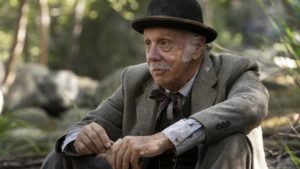 The film did take some getting used to and I didn’t fully appreciate it until my second watch. It just feels very different from the show and the new veneer is disconcerting at first. Not only is the town now lit with street lights and the buildings built from brick and stone, but it’s also shot in a more cinematic manner. Plus, there’s the fact that everyone looks really old. I enjoy how Charlie Utter is portrayed as a uniting figure in the town. He’s the character that offers sage advice to nearly everyone, everybody likes and is now referred to by Bullock and his children as “Uncle Charlie”. Therefore, he’s the perfect character to kill in order to get the whole camp to rally against Hearst. The thing is that Utter looks so different I could hardly think of him as the same character as the Charlie Utter from the series. It’s not just the look but actor Dayton Callie sounds very different too, and gone is his very memorable way of speaking. Part of the joy of the film is catching up with all these characters – and actors – and seeing how they’re different over a decade later. Although, it’s also fascinating to see who the unmoving, unshakable constants of Deadwood are. It’s great to see Tom Nuttall still behind the bar at the No. 10 saloon and Dan Dority and Johnny Burns doing the same at The Gem.
The film did take some getting used to and I didn’t fully appreciate it until my second watch. It just feels very different from the show and the new veneer is disconcerting at first. Not only is the town now lit with street lights and the buildings built from brick and stone, but it’s also shot in a more cinematic manner. Plus, there’s the fact that everyone looks really old. I enjoy how Charlie Utter is portrayed as a uniting figure in the town. He’s the character that offers sage advice to nearly everyone, everybody likes and is now referred to by Bullock and his children as “Uncle Charlie”. Therefore, he’s the perfect character to kill in order to get the whole camp to rally against Hearst. The thing is that Utter looks so different I could hardly think of him as the same character as the Charlie Utter from the series. It’s not just the look but actor Dayton Callie sounds very different too, and gone is his very memorable way of speaking. Part of the joy of the film is catching up with all these characters – and actors – and seeing how they’re different over a decade later. Although, it’s also fascinating to see who the unmoving, unshakable constants of Deadwood are. It’s great to see Tom Nuttall still behind the bar at the No. 10 saloon and Dan Dority and Johnny Burns doing the same at The Gem.
I do have some issues with film, the primary one being that the characters underestimate Hearst too much. Have they forgotten the events of the third season? That Hearst will do whatever it takes to get what he wants, such as having Alma shot at and Ellsworth killed. Utter refusing Hearst’s offer on his land is a clear death sentence and yet everyone is shocked when the inevitable happens and Charlie ends up with a bullet in his head. Hearst’s “predisposition for foul play” is only briefly mentioned once in the film’s first act and seemingly ignored just so the plot of the film can go ahead. The film also has some brief flashbacks to the events of the show, some of which I think are necessary and others I don’t. Trixie shooting Hearst and the aftermath of that event? Sure, that’s important to the plot and a recap is fairly vital, especially because it’s included to show that Hearst has remembered the event. But I really don’t like the flashback to when Wild Bill was shot and killed. I think a brief quiet moment during the hubbub of the No. 10 saloon of Jane simply gazing at an empty chair where Bill once sat would have played better.
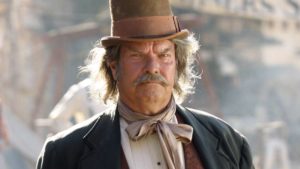 In ten years, Con Stapleton has gone from oafish goon for pimp Cy Tolliver to Deadwood’s latest reverend. He may be a weird character to focus on but I think I have a point coming up. It’s quite fascinating to have a worker for the devil (Cy) become a follower of God, the same journey the absent Andy Cramed took, but I’m much more interested in that journey than the destination. I wanted to explore what Con has been through and you just can’t do that in the limited time of a film. That’s probably the movie’s biggest failing: the medium just not allowing for the same storytelling and character work that the show offered so wonderfully. Although I guess it can be taken as a compliment when your main complaint is that you want more.
In ten years, Con Stapleton has gone from oafish goon for pimp Cy Tolliver to Deadwood’s latest reverend. He may be a weird character to focus on but I think I have a point coming up. It’s quite fascinating to have a worker for the devil (Cy) become a follower of God, the same journey the absent Andy Cramed took, but I’m much more interested in that journey than the destination. I wanted to explore what Con has been through and you just can’t do that in the limited time of a film. That’s probably the movie’s biggest failing: the medium just not allowing for the same storytelling and character work that the show offered so wonderfully. Although I guess it can be taken as a compliment when your main complaint is that you want more.
I’m not talking about a full season 4 in the way it was originally planned, although I do spend time thinking about what would have happened in that scenario. Would Sol Star have been mayor? Would Doc Cochrane have died from the tuberculosis he’s made an unbelievable recovery from by the time of the movie? Would Harry Manning have been proven right about fire safety and the camp set ablaze? Would the theatre troupe have done anything interesting?! I can’t help myself but theorise, but in terms of the movie we got I think it would have worked better as a very short mini-series of just 4 or 5 episodes. I understand the cost negates any benefit of the endeavour, but at times the film did feel like a collection of the most important scenes from a season of television edited together into a manageable runtime. It did feel weird to have characters go to sleep in the movie and then the next scene is them waking up. The episodes of the show almost always take place over a day, starting at dawn and ending at night, so seeing multiple days transpire was a shock to the system. A miniseries would also mean certain characters could arrive in camp at different times. The most unbelievable thing about the film is Jane, Hearst and Alma all arriving in Deadwood for the first time in years on the exact same day for different reasons. Alma doesn’t even have a good reason and arrives due to unseen business with the bank, though I suspect the thought of seeing Bullock again played a part.
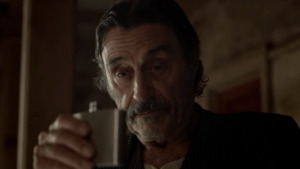 So, Deadwood ends with Al’s death (though it can be argued whether it occurred in the final moments of the film or if he’s still alive as the credits roll) and the birth of Trixie and Sol’s baby as the camp comes together to celebrate and see in the future on their own terms. It’s a great ending, and one I enjoy the more I think about it, and yet I think I may enjoy the ending of season 3 even more. Maybe it’s just the pessimist in me but I think the darker and more cynical ending of the show, where the camp still rallies together but is ultimately taken advantage of and controlled by outside political forces, is the more fitting. But I can see my opinion on that changing. Either way, I think the film is different enough from the show that both endings hold weight, and the film works as Deadwood’s epilogue while season 3 can still be seen as the ending. Whichever side you come down on, surely, we can all agree that the film is worthy of existence just for that scene where EB Farnum uses a telephone alone.
So, Deadwood ends with Al’s death (though it can be argued whether it occurred in the final moments of the film or if he’s still alive as the credits roll) and the birth of Trixie and Sol’s baby as the camp comes together to celebrate and see in the future on their own terms. It’s a great ending, and one I enjoy the more I think about it, and yet I think I may enjoy the ending of season 3 even more. Maybe it’s just the pessimist in me but I think the darker and more cynical ending of the show, where the camp still rallies together but is ultimately taken advantage of and controlled by outside political forces, is the more fitting. But I can see my opinion on that changing. Either way, I think the film is different enough from the show that both endings hold weight, and the film works as Deadwood’s epilogue while season 3 can still be seen as the ending. Whichever side you come down on, surely, we can all agree that the film is worthy of existence just for that scene where EB Farnum uses a telephone alone.
Have you seen the Deadwood movie? What do you think of it and do you prefer the film’s ending or season 3’s ending? Let me know in the comments and geek out with me about TV, movies and video-games on Twitter @kylebrrtt.




